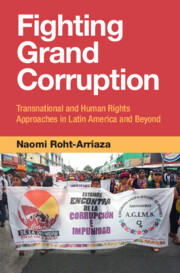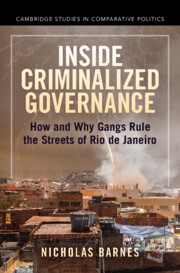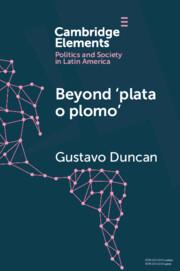Refine search
Actions for selected content:
23 results
When Elections Empower Crime: Political Protection and Milícia Expansion in Rio de Janeiro
-
- Journal:
- Latin American Politics and Society , FirstView
- Published online by Cambridge University Press:
- 10 September 2025, pp. 1-23
-
- Article
- Export citation
Criminal Governance in Latin America: Prevalence and Correlates
-
- Journal:
- Perspectives on Politics , First View
- Published online by Cambridge University Press:
- 12 August 2025, pp. 1-19
-
- Article
-
- You have access
- Open access
- HTML
- Export citation
Gangs, Drug Dealing, and Criminal Governance in Marseille, France
-
- Journal:
- European Journal of Sociology / Archives Européennes de Sociologie , First View
- Published online by Cambridge University Press:
- 11 June 2025, pp. 1-30
-
- Article
-
- You have access
- Open access
- HTML
- Export citation
1 - The Grand Corruption Problem
- from Part I - Setting the Stage: International and Transnational Law and Policies
-
- Book:
- Fighting Grand Corruption
- Published online:
- 03 April 2025
- Print publication:
- 10 April 2025, pp 3-18
-
- Chapter
- Export citation

Fighting Grand Corruption
- Transnational and Human Rights Approaches in Latin America and Beyond
-
- Published online:
- 03 April 2025
- Print publication:
- 10 April 2025
1 - Introduction
-
- Book:
- Inside Criminalized Governance
- Published online:
- 06 February 2025
- Print publication:
- 13 February 2025, pp 1-31
-
- Chapter
- Export citation

Inside Criminalized Governance
- How and Why Gangs Rule the Streets of Rio de Janeiro
-
- Published online:
- 06 February 2025
- Print publication:
- 13 February 2025
Sustaining Criminal Governance with Fear: The Use of Extra-lethal Violence to Regulate Community Life
-
- Journal:
- Journal of Latin American Studies / Volume 56 / Issue 4 / November 2024
- Published online by Cambridge University Press:
- 12 March 2025, pp. 656-682
- Print publication:
- November 2024
-
- Article
-
- You have access
- Open access
- HTML
- Export citation

Silencing Citizens
- How Criminal Groups Create Vacuums of Justice
-
- Published online:
- 04 September 2024
- Print publication:
- 23 May 2024
5 - Evidence
- from Part II - How Criminal Groups Prevent Cooperation
-
- Book:
- Silencing Citizens
- Published online:
- 04 September 2024
- Print publication:
- 23 May 2024, pp 152-174
-
- Chapter
- Export citation
Conclusion
-
- Book:
- Silencing Citizens
- Published online:
- 04 September 2024
- Print publication:
- 23 May 2024, pp 259-276
-
- Chapter
- Export citation
4 - Evidence
- from Part II - How Criminal Groups Prevent Cooperation
-
- Book:
- Silencing Citizens
- Published online:
- 04 September 2024
- Print publication:
- 23 May 2024, pp 127-151
-
- Chapter
- Export citation
2 - Research Design and Definitions
- from Part I - Why Police–Citizen Cooperation Matters
-
- Book:
- Silencing Citizens
- Published online:
- 04 September 2024
- Print publication:
- 23 May 2024, pp 61-86
-
- Chapter
- Export citation
1 - Study Motivation
- from Part I - Why Police–Citizen Cooperation Matters
-
- Book:
- Silencing Citizens
- Published online:
- 04 September 2024
- Print publication:
- 23 May 2024, pp 27-60
-
- Chapter
- Export citation
Introduction
-
- Book:
- Silencing Citizens
- Published online:
- 04 September 2024
- Print publication:
- 23 May 2024, pp 1-24
-
- Chapter
- Export citation
3 - Theory
- from Part II - How Criminal Groups Prevent Cooperation
-
- Book:
- Silencing Citizens
- Published online:
- 04 September 2024
- Print publication:
- 23 May 2024, pp 89-126
-
- Chapter
- Export citation
The Criminal Governance of Tourism: Extortion and Intimacy in Medellín
-
- Journal:
- Journal of Latin American Studies / Volume 55 / Issue 2 / May 2023
- Published online by Cambridge University Press:
- 27 February 2023, pp. 323-348
- Print publication:
- May 2023
-
- Article
-
- You have access
- Open access
- HTML
- Export citation

Beyond 'plata o plomo'
- Drugs and State Reconfiguration in Colombia
-
- Published online:
- 07 October 2022
- Print publication:
- 06 October 2022
-
- Element
- Export citation
Smuggling and Border Enforcement
-
- Journal:
- International Organization / Volume 76 / Issue 4 / Fall 2022
- Published online by Cambridge University Press:
- 16 May 2022, pp. 830-867
- Print publication:
- Fall 2022
-
- Article
-
- You have access
- Open access
- HTML
- Export citation
7 - Summing Up and Next Steps
- from Part III - Collective Vigilantism and the Coproduction of Order
-
- Book:
- Resisting Extortion
- Published online:
- 23 December 2021
- Print publication:
- 06 January 2022, pp 177-198
-
- Chapter
- Export citation
